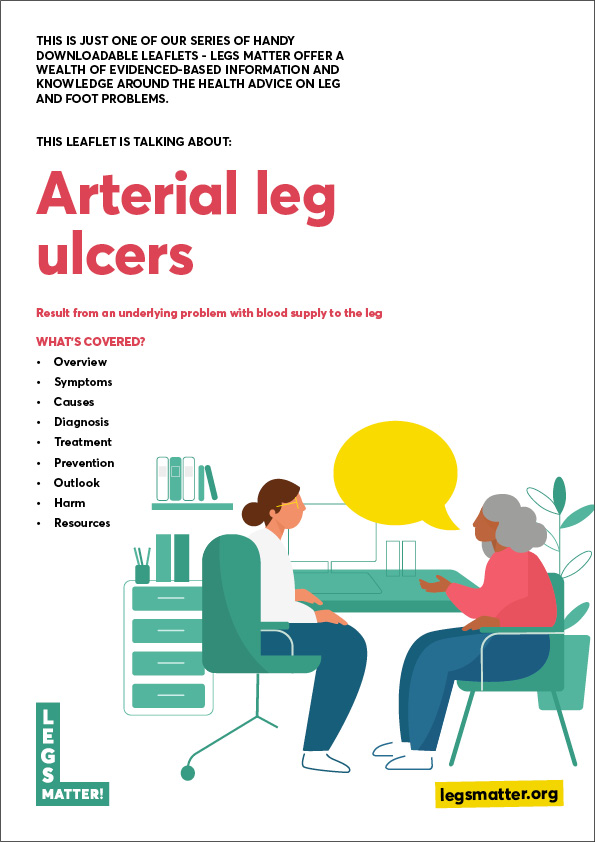Overview – what is an arterial leg ulcer?
Arterial ulceration can occur on the foot or lower leg and is the result of an underlying problem with the supply of blood to the leg. It is part of a condition also known as peripheral arterial disease (PAD).
Symptoms – what are the key symptoms of arterial leg ulcers?
Symptoms can include:
- Numbness or weakness in your leg
- The skin on your leg can look red when hanging down and go paler when lifted up
- A non-healing wound which is very painful
- Pain which can be usually worse at night and many people complain that they cannot sleep in bed. This results in them sleeping in a chair or feeling the only way to get relief if they hang their foot out of the bed
What causes arterial leg ulcers?
Arterial ulceration stems from a condition known as peripheral arterial disease (PAD).
It is caused by a build up of fatty deposits inside the arteries of the leg. Over time these deposits make the arteries narrower and result in a restriction of the blood flow to the leg. This is also called atherosclerosis.
Risk factors include
- Smoking
- High blood pressure
- Diabetes
- High cholesterol
Diagnosis – getting diagnosed with an arterial leg ulcer
Your GP or Practice Nurse will carry out an assessment of your legs. They will look for evidence of wounds, shiny skin, lack of hair and brittle toenails. They will also feel for the pulses in your groin, behind your knee and your feet. After this they should complete a test called an ABPI which takes the blood pressure of both arms and both feet and compares the results. If you have arterial disease the blood pressure in your legs will be lower.
In some cases, people with Peripheral Arterial Disease (PAD) can develop critical limb threatening ischaemia which is when the blood supply has become severely restricted. This is a serious complication and requires urgent medical attention. In some cases, an amputation of the lower limb is required
You should be aware of:
- Severe pain in your foot and leg which does not go away even when resting
- Your foot changing colour and becoming cold and numb
- Your wound turning black (necrosis) and beginning to smell. Be aware that skin changes may be harder to see on black or brown skin
Treatment – how to treat arterial leg ulcers
If your healthcare professional has informed you that they suspect the ulceration is arterial in nature they should refer you to the Vascular Department for specialist input.
For some people, the treatment will include procedures to improve the blood supply.
It is usual practice that the Vascular Consultant or Nurse will see you and will arrange for you to have a scan to look at the arteries in more detail. This will give further information to make a decision whether you might want to consider surgery. Sometimes a narrowing or blockage in your artery can be opened up and stretched using a small balloon (angioplasty). This procedure is done under a local anaesthetic in the radiology department of hospital.
If your symptoms are very severe and the blockage is too big to open up with a balloon, a bypass operation might be an option. This is where a vein from your leg or an artificial artery is used to carry the blood past the blockage. Your vascular specialist will talk through the options with you.
Once the supply has been restored, most people will see an improvement in the ulceration and their pain will also reduce.
Prevention – how to prevent arterial leg ulcers occurring or reoccuring
If you are a smoker, the single most important change that can be made is to stop smoking. If you continue to smoke your symptoms will undoubtedly progress.
Exercise is proven to be a significant factor in reducing the severity in symptoms of PAD. It is also good for improving your mood and self-esteem. Living with arterial disease or ulceration can be upsetting and affect your quality of life.
How to reduce the risks of vascular disease (web page)
Outlook – healing arterial leg ulcers
Arterial disease is not curable but can be treated and maintained with lifestyle changes and the addition of medications.
Your GP should start you on a high dose statin and an anti-platelet such as Aspirin or Clopidogrel. Arterial ulceration will often improve once the blood supply has been restored.
Harm – the risk factors
Inaction or insufficient action on arterial leg / foot ulcers can cause harm. This includes:
- Not checking legs properly or doing basic checks, such as a Doppler test
- Not performing a vascular assessment
- Not being referred to vascular services if required
If you have any concerns about the treatment or care you are receiving, it is important to speak up.
Resources – for arterial ulcers
Angioplasty and stent configure (web page)
Problems with leg circulation (web page)
How to reduce the risks of vascular disease (web page)
Arterial leg ulcers downloadable leaflet (PDF)
We’ve created a handy downloadable leaflet of the key information on this page so you can easily print it out for personal reference or to hand to a patient or healthcare professional. Or you can also simply forward it on by email.
Other support
Some organisations you can contact for further information.
Accelerate Based in East London, Accelerate can accept national referrals from your GP / specialist to our world-class centre where we pioneer and trial experimental new treatments for chronic leg ulcers / wounds, lymphoedema and mobility challenges.
Contact details
020 3819 6022
hello@acceleratecic.com
Find out more on the Accelerate website
British Heart Foundation The British Heart Foundation were founded in 1961 by a group of medical professionals wanting to fund extra research into the causes, diagnosis, treatment and prevention of heart and circulatory disease. Today they are the nation's heart charity and the largest independent funder of cardiovascular research.
Contact details
0300 330 3322
supporterservices@bhf.org.uk
Find out more on the British Heart Foundation website
Diabetes UK Diabetes UK are the leading UK charity for people affected by diabetes it’s their responsibility to lead the fight against the growing crisis. And this fight is one that involves all everyone – sharing knowledge and taking diabetes on together.
Contact details
0345 123 2399
helpline@diabetes.org.uk
Find out more on the Diabetes UK website
The Circulation Foundation The Circulation Foundation is the UK’s only dedicated vascular charity. They fund and promote research into the causes, treatment and prevention of vascular disease.
Contact details
020 7205 7151
info@circulationfoundation.org.uk
Find out more on The Circulation Foundation website
The Lindsay Leg Club Foundation Promoting and supporting community based treatment, health promotion, education and ongoing care for people who are experiencing leg-related problems - including leg ulcers and other wound care issues.
Contact details
01473 749565
lynn.bullock@legclubfoundation.com
Find out more on the Lindsay Leg Club Foundation website
Tell us what you think
If there’s anything you want to ask us or tell us, whether it’s a suggestion about our website, a complaint, or a compliment, drop us a line at
support@legsmatter.org










